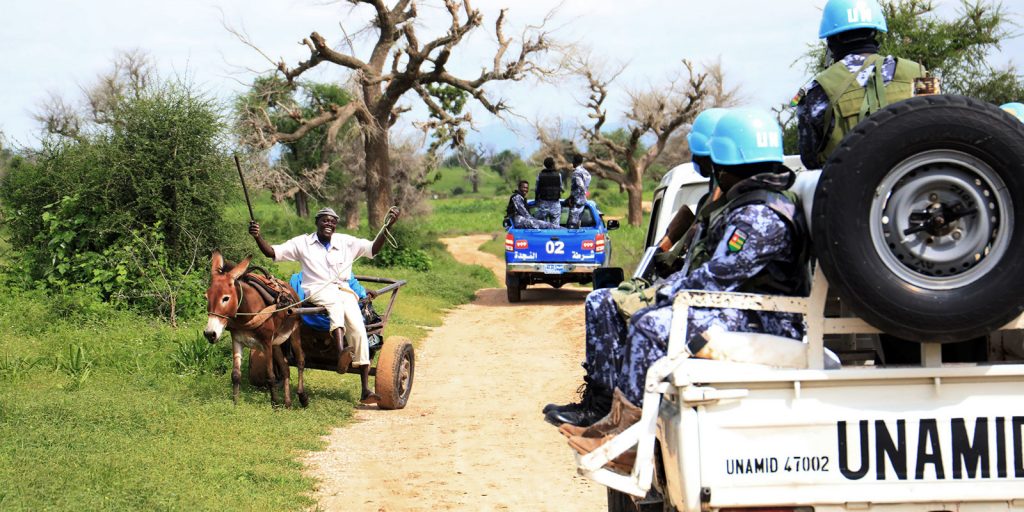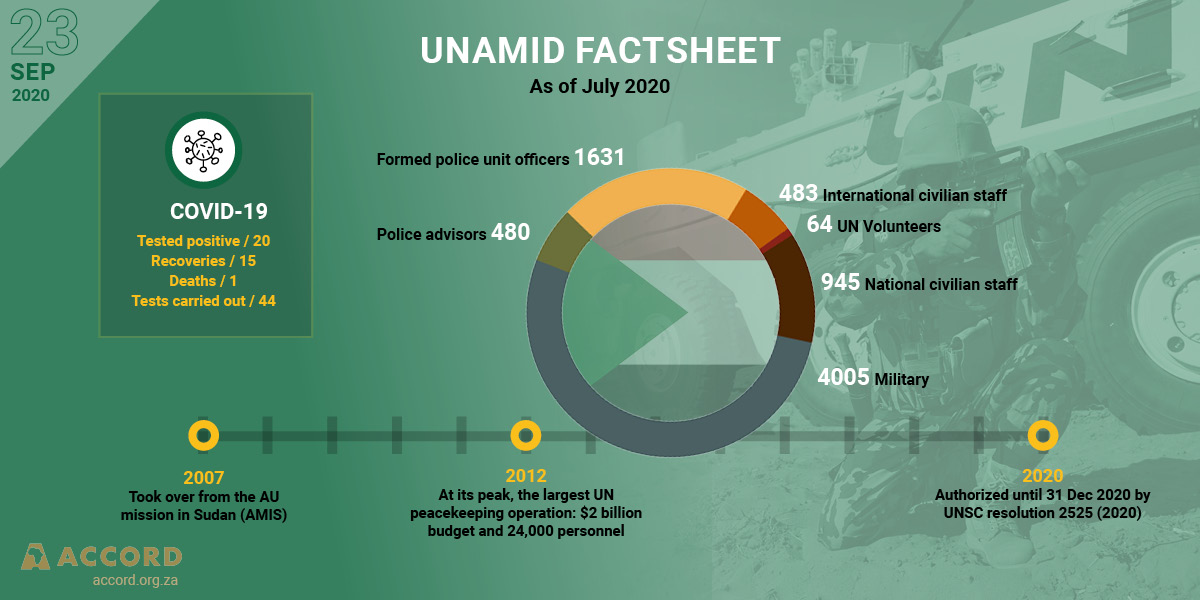Many of these transformations have unfolded alongside the United Nations’ (UN) own peacekeeping transition in the country – a process that began before the overthrow of the Bashir regime, but has similarly been forced to adapt to sweeping changes across the country. The COVID-19 pandemic has caused challenges across many countries, and has added yet another layer of complexity to how the UN is adapting its support to Sudan. The pandemic has impacted many areas of this transition process, but also demonstrates various degrees of resilience by the Sudanese and the UN to improve their efforts.
The #COVID-19 pandemic will test the resilience of Sudanese institutions and communities, and their international partners, as they navigate many of the crucial political steps during its transformations @FortiD
Tweet
The closure of the African Union (AU)–UN Hybrid Operation in Darfur (UNAMID) has been on the UN Security Council’s (UNSC) agenda since 2017, with resolutions 2363 and 2429 shaping the transition’s initial trajectory. The initial schedule was upended by Sudan’s political revolution and, in October 2019, led the AU Peace and Security Council (PSC) and the UNSC to extend UNAMID’s mandate until 31 October 2020. Although the UNSC members initially committed to establishing a successor mission by 31 March, the COVID-19 pandemic made this deadline impossible to meet.
Virtual working methods adopted by the UNSC in mid-March to ensure minimum levels of business continuity could not compensate for the valuable, in-person discussions that had brokered previous diplomatic impasses on Sudan. UNSC members hesitated to rush through such significant decisions about the UN transition in Sudan, in part because of the uncertainty about how the pandemic would impact the country. The UNSC temporarily extended its own deadline for the new mission from the end of March until the end of May. After much debate, the UNSC adopted successive resolutions on 3 June, establishing the UN Integrated Transitional Assistance Mission for Sudan (UNITAMS), and refocusing UNAMID’s mandate and extending the mission until 31 December.
While the pandemic has delayed political deliberations on Sudan within the UNSC, it has also impacted on the strategic direction of the UN peacekeeping transition. In particular, it has affected UNAMID’s work in Darfur and the UN’s abilities to accelerate planning for UNITAMS.
The pandemic has contributed to multiple delays in the Juba peace process between the Sudanese transitional government and some of the country’s armed movements. UNAMID provided logistical and technical support to this peace process, and one of the mission’s most important contributions was the convening of multiple consultations with Darfur-based internally displaced persons (IDPs) and civil society organisations to support their participation in the process. However, the pandemic limited in-person meetings and UNAMID’s interactions with various Darfuri stakeholders, who are otherwise unable to engage in the peace process. With preparations underway for a final agreement to be signed in early October, the UN will now need to calibrate these developments into its broader political strategy for the country and determine how it can tangibly support the agreement’s implementation. In doing so, the UN will also need to factor in its diminished operational presence and the impact of COVID-19 movement restrictions on the approaches and sequencing of possible advisory work and technical support.

UNAMID’s protection efforts have also been hampered by the pandemic and related mitigation efforts. UN peace operations have been forced to adapt their day-to-day efforts, especially on how they execute their protection of civilian and peacebuilding mandates – and UNAMID is not immune to these changes. The mission continues to prioritise life-saving activities, provide humanitarian escorts and undertake verification missions. However, pandemic mitigation efforts have forced the mission to reduce the frequency of routine patrols and limit its engagements with Darfuri communities. UNAMID has also reoriented much of its work to support Sudanese authorities in responding to the pandemic, including through the peacebuilding-focused state liaison functions (SLFs). Although these are necessary steps, the competing pressures on UNAMID come alongside an alarming rise in violent attacks throughout Darfur. This trend magnifies the pressure on Sudanese authorities and the UN to demonstrate that UNAMID’s anticipated exit will not further exacerbate risks to civilians.
Not only has the pandemic impacted on much of the UN’s substantive work in Darfur, it has also impeded the organisation’s planning efforts for the broader peacekeeping transition. Prior to the COVID-19 outbreak, some UNSC members hoped that UNAMID could restart its drawdown shortly after the initial March mandate renewal. However, the UN’s decision to freeze troop rotations because of the pandemic, coinciding with the beginning of Sudan’s rainy season in June, led UN Under-Secretary-General, Jean-Pierre Lacroix, to conclude that the drawdown period would need to extend for “many months” beyond October 2020.
UN-wide planning for the new UNITAMS mission accelerated in early April, but was predominantly confined to virtual consultations between colleagues in New York, Khartoum, Darfur and Addis Ababa. Although the planning team made tangible headway in articulating how to implement UNITAMS’s mandate, travel restrictions made it challenging for the team to engage meaningfully with Sudanese counterparts early in the process. The planning team could only convene direct, in-person consultations in Sudan in late July/early August, and had to compensate as best as possible for the limited time in advance of its September reporting requirement to the UNSC.
These immediate impacts of the pandemic complicate what is already the UN’s most complex peacekeeping transition to date. However, COVID-19’s medium- and long-term impacts – which are still unclear, to some degree – will likely have profound implications for Sudan’s political transition and for UN support to the country. Sudan is already confronting massive economic turbulence, which will be amplified because of the pandemic. The country’s social and health sectors will likely face further stress, even with valuable influxes of financial support from international partners. Partners throughout the country (including the UN Country Team) are working closely with Sudanese counterparts to carefully balance the pandemic response with urgent development and humanitarian priorities. However, the recently declared economic state of emergency underscores the urgency of the country’s economic conditions, and the threats these conditions pose to broader political transition.
UN reconfigurations are ultimately about adjusting international engagement with a country to better support national peacebuilding and development priorities. While transitions often unfold in fluid political contexts, the UN’s experience in Sudan over the past year-and-a-half underscores just how challenging these processes can be. Sudan’s political revolution has created a window of opportunity for international actors to shift their support to the Sudanese people in their pursuit of a more sustainable peace, based on a new social contract. The COVID-19 pandemic will test the resilience of Sudanese institutions and communities, and their international partners, as they navigate many of these crucial transformations.
Daniel Forti is a senior policy analyst at the International Peace Institute’s (IPI) Brian Urquhart Center for Peace Operations. His current work focuses on issues related to peace operations and partnerships between the United Nations and the African Union.

